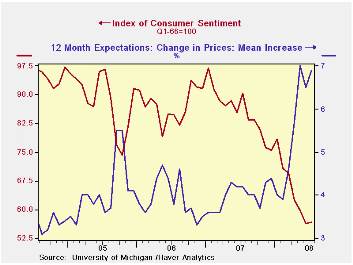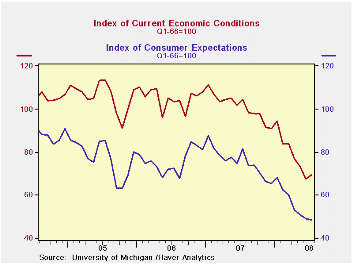 Global| Jul 11 2008
Global| Jul 11 2008Michigan Consumer Sentiment Up Slightly
by:Tom Moeller
|in:Economy in Brief
Summary
The University of Michigan's index of consumer sentiment in early July ticked up 0.4% versus the June average to a level of 56.6. The rise beat Consensus expectations for a slight decline. Nevertheless the level of sentiment remained [...]

The University of Michigan's index of consumer sentiment in early July ticked up 0.4% versus the June average to a level of 56.6. The rise beat Consensus expectations for a slight decline. Nevertheless the level of sentiment remained near the lowest level since 1980.
During the last ten years there has been a 47% correlation between the level of sentiment and the three month change in real consumer spending.
The current conditions index improved 2.8% (-33.5% y/y) but that made up just a sliver of the recent monthly declines. The rise was due to a sharp increase in the index of whether now is a good time to buy large household goods to the highest level since March (-26.9% y/y). The view of current personal finances fell yet again (-44.3% y/y).
The expectations component of overall sentiment fell another 1.8% as the index fell to its lowest level since 1980. Expectations for personal finances dropped 2.1% (-24.8% y/y) like it did during the prior two months. It was at its lowest level since 1980 while expectations for business conditions during the next five years improved just slightly but remained near the lowest level since 1990.
The opinion of government policy, which apparently influences economic expectations, gave back its June improvement. It was it's lowest since 1992 as only 4% of respondents had a favorable opinion of government policy and 52% thought a poor job was being done. An only fair opinion of policy was held by 42% of respondents.
The mean expected rate of inflation during the next twelve months rose back to 6.9%, about equal to its 1981 high. During the next five years the expected inflation rate slipped to 3.8%.
The University of Michigan survey is not seasonally adjusted.The reading is based on telephone interviews with about 500 households at month-end; the mid-month results are based on about 300 interviews. The summary indexes are in Haver's USECON database, with details in the proprietary UMSCA database.
Has the Behavior of Inflation and Long-Term Inflation Expectations Changed? from the Federal Reserve Bank of Kansas city is available here.
| University of Michigan | July (Prelim.) | June | May | July y/y | 2007 | 2006 | 2005 |
|---|---|---|---|---|---|---|---|
| Consumer Sentiment | 56.6 | 56.4 | 59.8 | -37.4% | 85.6 | 87.3 | 88.5 |
| Current Conditions | 69.5 | 67.6 | 73.3 | -33.5% | 101.2 | 105.1 | 105.9 |
| Expectations | 48.3 | 49.2 | 51.1 | -40.7% | 75.6 | 75.9 | 77.4 |
Tom Moeller
AuthorMore in Author Profile »Prior to joining Haver Analytics in 2000, Mr. Moeller worked as the Economist at Chancellor Capital Management from 1985 to 1999. There, he developed comprehensive economic forecasts and interpreted economic data for equity and fixed income portfolio managers. Also at Chancellor, Mr. Moeller worked as an equity analyst and was responsible for researching and rating companies in the economically sensitive automobile and housing industries for investment in Chancellor’s equity portfolio. Prior to joining Chancellor, Mr. Moeller was an Economist at Citibank from 1979 to 1984. He also analyzed pricing behavior in the metals industry for the Council on Wage and Price Stability in Washington, D.C. In 1999, Mr. Moeller received the award for most accurate forecast from the Forecasters' Club of New York. From 1990 to 1992 he was President of the New York Association for Business Economists. Mr. Moeller earned an M.B.A. in Finance from Fordham University, where he graduated in 1987. He holds a Bachelor of Arts in Economics from George Washington University.
More Economy in Brief
 Global| Feb 05 2026
Global| Feb 05 2026Charts of the Week: Balanced Policy, Resilient Data and AI Narratives
by:Andrew Cates






